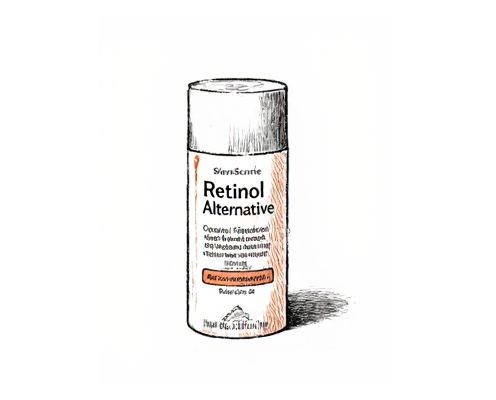
Retinol alternative Illustration
Bakuchiol is a gentle retinol alternative that provides similar anti-aging benefits without the irritation often associated with traditional retinol. It helps improve skin texture, reduce fine lines, and brighten complexion while being suitable for sensitive skin. Regular use of bakuchiol supports collagen production and promotes a smoother, more youthful appearance.
Understanding the Rise of Retinol Alternatives in Skincare
Retinol alternatives like bakuchiol and peptides have surged in popularity due to their gentler impact on sensitive skin while still promoting collagen production and reducing fine lines. These ingredients offer comparable anti-aging benefits without the irritation commonly associated with retinol, making them suitable for a broader range of skin types. You can achieve youthful, radiant skin by choosing the right retinol alternative tailored to your skincare needs.
Why Choose Retinol Alternatives for Sensitive Skin
Retinol alternatives like bakuchiol and niacinamide provide effective anti-aging benefits without causing irritation often associated with retinol, making them ideal for sensitive skin types. These gentle ingredients help reduce fine lines, improve skin texture, and promote collagen production while minimizing redness and dryness. Choosing retinol alternatives supports maintaining skin health and achieving smooth, radiant skin without the harsh side effects common in traditional retinol treatments.
Top Benefits of Using Retinol Alternatives
Retinol alternatives like Bakuchiol and Azelaic Acid offer similar anti-aging and skin-brightening benefits without causing irritation or increased sensitivity often linked to retinol. These gentler options promote collagen production, reduce fine lines, and improve skin texture while being suitable for sensitive and acne-prone skin. Choosing retinol alternatives supports consistent skincare routines with less risk of redness and peeling.
Key Plant-Based Ingredients in Retinol Substitutes
Bakuchiol, derived from the Psoralea corylifolia plant, is a prominent retinol alternative known for its anti-aging and anti-inflammatory properties without causing irritation. Rosehip oil, rich in vitamin A, antioxidants, and essential fatty acids, promotes skin regeneration and improves texture while providing gentle exfoliation. Sea buckthorn oil contains a high concentration of beta-carotene and vitamins C and E, supporting collagen production and skin hydration as a natural substitute for retinol.
Bakuchiol: Nature’s Widely Trusted Retinol Alternative
Bakuchiol is widely recognized as an effective retinol alternative derived from the Psoralea corylifolia plant, offering gentle yet powerful benefits for your skin. Unlike traditional retinol, Bakuchiol reduces signs of aging and improves skin texture without causing irritation or sensitivity, making it suitable for all skin types. Your skincare routine can benefit from Bakuchiol's antioxidant properties, which promote collagen production and enhance overall skin radiance naturally.
Peptides and Ceramides: Supportive Ingredients for Youthful Skin
Peptides and ceramides serve as effective retinol alternatives by promoting collagen production and strengthening the skin barrier for a youthful, hydrated complexion. Peptides stimulate cellular repair and enhance skin elasticity, while ceramides restore moisture and protect against environmental damage. Incorporating these ingredients into a daily skincare routine helps reduce fine lines and improve overall skin texture without the irritation often associated with retinol.
How to Incorporate Retinol Alternatives into Your Skincare Routine
Incorporate retinol alternatives like bakuchiol or peptides by applying them at night after cleansing and before moisturizing to enhance collagen production and improve skin texture. Start with a low concentration to minimize irritation and gradually increase usage frequency based on skin tolerance. Consistent use combined with daily sunscreen protection maximizes anti-aging benefits while reducing sensitivity risks commonly associated with retinol.
Retinol Alternatives for Pregnant and Breastfeeding Women
Bakuchiol is a popular retinol alternative for pregnant and breastfeeding women, providing similar anti-aging benefits without the irritation or sensitivity associated with retinol. Derived from the babchi plant, bakuchiol offers antioxidant and anti-inflammatory properties that promote collagen production and improve skin texture safely during pregnancy. Another effective option is azelaic acid, which helps reduce acne and hyperpigmentation without the risk of hormonal disruption, making it suitable for sensitive, pregnancy-safe skincare routines.
Common Side Effects and How to Avoid Them
Bakuchiol serves as a popular retinol alternative, offering similar anti-aging benefits with fewer common side effects such as irritation, redness, and peeling. To minimize adverse reactions, start with a low concentration, perform a patch test, and gradually increase usage frequency. Incorporating hydrating moisturizers and sun protection further helps avoid dryness and sensitivity commonly associated with retinol-like products.
Expert Tips for Maximizing Results with Retinol Alternatives
Incorporating bakuchiol as a retinol alternative leverages its antioxidant and anti-inflammatory properties while minimizing irritation common with retinol. Experts emphasize consistent nighttime application combined with broad-spectrum sunscreen during the day to protect newly renewed skin cells. Complementing bakuchiol with hydrating ingredients like hyaluronic acid enhances skin barrier function and boosts overall radiance without sensitivity.
 womendy.com
womendy.com